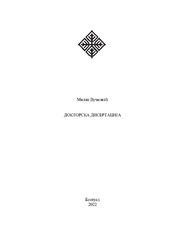| dc.contributor.advisor | Илић, Влатко | |
| dc.contributor.other | Вуксановић, Дивна | |
| dc.contributor.other | Јевтовић, Зоран | |
| dc.contributor.other | Ћаловић, Драган | |
| dc.contributor.other | Миловановић, Александра | |
| dc.creator | Вучковић, Милан | |
| dc.date.accessioned | 2022-12-30T09:33:10Z | |
| dc.date.available | 2022-12-30T09:33:10Z | |
| dc.date.issued | 2023-04-24 | |
| dc.date.submitted | 2022-12-30 | |
| dc.identifier.uri | http://eteze.arts.bg.ac.rs/handle/123456789/586 | |
| dc.description.abstract | У раду се бавимо проблемом кризе у савременој култури који доводимо у везу са екранским медијима. Кризу у култури препознајемо с обзиром на теоретизацију културе као ситуационо условљеног модалитета односа човека према свету, који се као такав формира у раној модерности и развија се током секуларизације западноевропске цивилизације. Културу третирамо као процес у којем човек изграђујући свет, изграђује сопствени идентитет. У складу са тим, питање кризе у култури у непосредној је вези са питањем кризе човека који као самосвесно, рефлектујуће биће израста из кулутуре.
Основну хипотезу заснивамо на претпоставци да је кључни предуслов културе уочавање света који се човеку указује као страни ентитет што резултира осећањем недовољне припадности свету. Такав осећај раздељености покреће културу као идејно и практично ангажовање у смеру приближавања човека и света чиме нараста и осећај припадности свету. Уз претпоставку да је доживљај расцепа између човека и света основни предуслов културе, у раду разматрамо ефекте корисништва екранских медија који се односе на немогућност опажања тог расцепа. У основи корисништва екранских медија јесте перцепција тзв. екранске стварности која се доживљава као стварна стварност, док је заправо на делу један специфични, технолошки условљени облик њене репрезентације. У екранској стварности свет се опажа као блискији човеку чиме слаби доживљај света као другости, чиме се отклањају и предуслови за културу.
Рад се води претпоставком континуитета између модерног и савременог доба који се огледа у слободи човека да самостално и слободно изграђује своја мишљења и уверења неограничен оквирима предмодерне трансценденције. Претпоставка слободе човека да у савременим условима мења себе и свет, се, међутим, у раду преиспитује, што доводи до увида да савремено доба, осим континуитета са модерношћу, поприма карактеристике предмодерне уоквирености човека у дати космички поредак, при чему се умањују могућности да се из њега искорачи. | en |
| dc.description.abstract | In this thesis, we deal with the problem of crisis in contemporary culture, which we relate to the screen media. We recognize the crisis in culture with regard to the theorization of culture as a situationally conditioned modality of man's relationship with the world that arises in early modernity and develops during the secularization of Western European civilization. We treat culture as a process in which a man builds his own identity while building the world. Accordingly, the issue of the crisis in culture is directly related to the issue of the crisis of a man who, as a self-aware, reflective being, grows out of culture.
We base our main hypothesis on the assumption that the key precondition of culture is the perception of the world that appears to a man as a foreign entity, which results in a feeling of insufficient belonging to the world. Such a sense of division drives culture as an ideological and practical engagement in the direction of bringing people and the world closer together, which also increases the sense of belonging to the world. With the assumption that the experience of a split between a man and the world is a basic precondition of culture, in this thesis we consider the effects of screen media consumption related to the impossibility of perceiving that split. The basis of the consumption of screen media is the perception of the so-called screen reality that is perceived as real reality, while in fact a specific, technologically determined form of its representation is at work. In screen reality, the world is perceived as closer to a man, which weakens the feeling of the world as otherness, which removes the preconditions for culture.
The work is guided by the assumption of continuity between modern and contemporary times, which is reflected in the freedom of a man to independently and freely build his opinions and beliefs, not limited by the framework of pre-modern transcendence. The assumption of a man's freedom to change himself and the world in contemporary conditions is, however, reexamined in the work, which leads to the insight that the оur age, apart from continuity with modernity, takes on the characteristics of the pre-modern framing of a man in a given cosmic order, reducing the possibilities to step out of it. | en |
| dc.language.iso | sc | en |
| dc.publisher | Универзитет уметности у Београду, Факултет драмских уметности | sr |
| dc.source | Факултет драмских уметности | sr |
| dc.subject | култура, криза, екрански медији, принцип културе, принцип индустрије, стварност, перцепција, корисништво | en |
| dc.subject | culture, crisis, screen media, principle of culture, principle of industry, reality, perception, usability | en |
| dc.title | УТИЦАЈ ЕКРАНСКИХ МЕДИЈА НА КРИЗУ У САВРЕМЕНОЈ КУЛТУРИ: Модернизам и нова медијска парадигма | en |
| dc.type | doctoralThesis | en |

